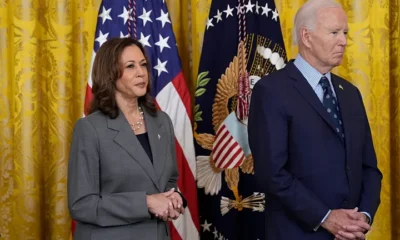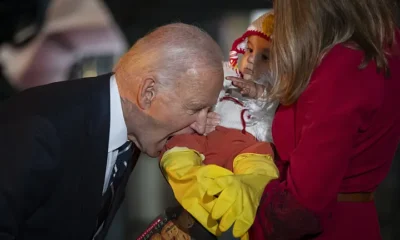CELEBRITY
US commemorates 9/11 attacks with victims in focus and politics in view

The United States commemorates the September 11 attacks each year with a blend of solemn remembrance and political reflection.
The attacks, which took place in 2001, were a series of coordinated terrorist acts by the extremist group al-Qaeda.
They resulted in the deaths of nearly 3,000 people and had profound impacts on American society and global politics.
**Remembrance of Victims**
Every year on September 11, ceremonies are held at various locations, most notably at the National September 11 Memorial & Museum in New York City, the Pentagon Memorial in Arlington, Virginia, and the Flight 93 National Memorial in Shanksville, Pennsylvania.
These sites honor the nearly 3,000 victims who perished in the attacks.
**New York City:** The memorial at Ground Zero features two reflecting pools set within the footprints of the Twin Towers, surrounded by bronze plaques inscribed with the names of the victims.
The annual commemoration involves a reading of these names, along with moments of silence observed at the times when each plane hit its target and when the towers fell.
Family members of the victims often speak or participate in these ceremonies, sharing personal reflections and tributes.
**Arlington, Virginia:** At the Pentagon Memorial, dedicated on September 11, 2008, each of the 184 benches represents a victim, arranged by birth year to reflect the lives lost across generations.
The ceremony here includes laying wreaths, speeches by political leaders, and a moment of silence.
**Shanksville, Pennsylvania:** The Flight 93 National Memorial honors the 40 passengers and crew who fought back against the hijackers, preventing the plane from reaching its intended target.
The memorial features a wall with the names of the victims and a flight path trail that marks the plane’s trajectory.
**Political Context**
The commemoration of 9/11 also serves as a backdrop for political reflection and discourse.
Over the years, various administrations have used the occasion to discuss the progress made in counterterrorism, military engagements, and national security policies.
**Domestic Policy:** Leaders often use the anniversary to highlight advancements in counterterrorism and homeland security measures.
There is a focus on the ongoing need to protect the nation from future threats and to support the first responders and veterans who have been impacted by the aftermath of the attacks.
**Foreign Policy:** The legacy of 9/11 has shaped U.S. foreign policy, leading to the wars in Afghanistan and Iraq, and influencing global counterterrorism efforts.
Commemorations sometimes include discussions on the current status of these conflicts and the broader implications of U.S. military and diplomatic actions.
**Political Tensions:** The 9/11 anniversary can also be a time of political tension, as debates arise over issues such as surveillance, civil liberties, and the role of the U.S. in global conflicts.
Political leaders and commentators might address or reflect on how the events of 9/11 continue to shape American politics and society.
Overall, while the primary focus of the 9/11 commemorations is to honor the victims and their families, the events also serve as a moment to reflect on broader political and societal changes that have emerged in the wake of the attacks.
















